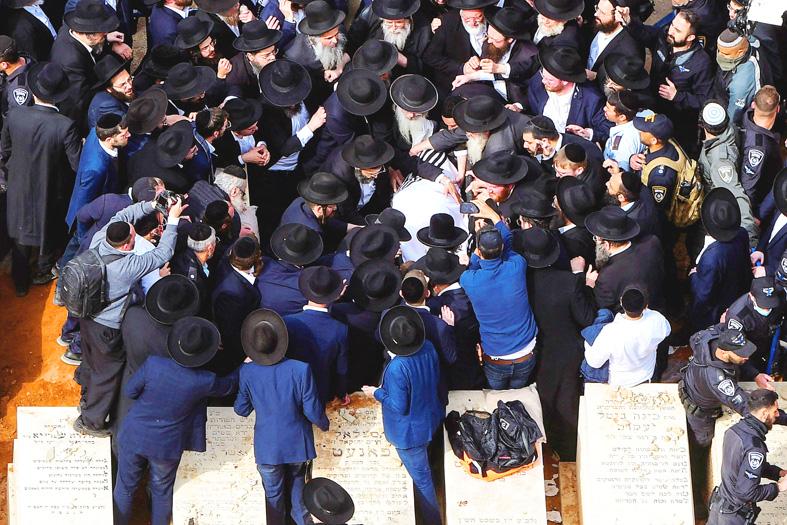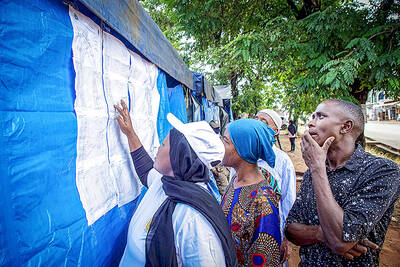An estimated 750,000 Orthodox Jews on Sunday packed Bnei Brak, Israel, for the funeral of influential rabbi Chaim Kanievsky, known to his followers as the “Prince of Torah.”
Authorities had voiced fears of disaster from massive overcrowding as a sea of men and boys filled streets, sidewalks and balconies in the city near Tel Aviv to mourn the Belarusian-born Kanievsky, who died on Friday at the age of 94.
A separate women’s section had been created ahead of the event, which the Magen David Adom rescue agency estimated would be one of the biggest gatherings in “Israel history.”

Photo: Reuters
After Kanievsky was buried at a Bnei Brak cemetery, the rescue agency said that the funeral procession was completed with “no serious incidents.”
Police put the crowd at 750,000, about 8 percent of the Israeli population.
It included Shlomo Lugassi, who said that earlier in the day, he had unsuccessfully tried to push his way through the masses to reach the late rabbi’s apartment.
“I cried when I heard he was dead,” the 41-year-old said ahead of the burial.
Thousands of police and paramilitary officers, as well as volunteers, were deployed to provide security for the funeral held 11 months after a disaster at Mount Meron, an Orthodox pilgrimage site where 45 people died in a stampede.
“The trauma of the Meron disaster is still fresh for all of us,” Israeli Prime Minister Naftali Bennett had warned before his weekly Cabinet meeting on Sunday.
He described Kanievsky’s death as “a great loss to the Jewish people.”
Kanievsky was the de facto head of what is commonly called the Lithuanian branch of Orthodox Judaism, and his knowledge of Jewish law was so revered that his rulings were thought to require total compliance within his community.
To some followers, he was known as “our master, the Prince of Torah,” comprising the religion’s laws and traditions.
Benjamin Brown, a professor of Jewish thought at Hebrew University, said that Kanievsky “came to be a figure of authority almost against his own will.”
“He wanted to keep learning and studying Torah [quietly]” but accepted a leadership role to help heal rifts within the Lithuanian Orthodox community, Brown said.
Israel’s Orthodox Jews are split among various factions and groups, but Kanievsky was seen by some as a unifying figure.
Aryeh Deri, a political leader and rabbi from the Sephardic group — which has its roots in southern Europe and North Africa — told Israel’s Channel 11 that Kanievsky transcended “definition.”
Kanievsky, despite his prominence, lived in a modest Bnei Brak apartment, where religious texts lined the walls of a small study.

With much pomp and circumstance, Cairo is today to inaugurate the long-awaited Grand Egyptian Museum (GEM), widely presented as the crowning jewel on authorities’ efforts to overhaul the country’s vital tourism industry. With a panoramic view of the Giza pyramids plateau, the museum houses thousands of artifacts spanning more than 5,000 years of Egyptian antiquity at a whopping cost of more than US$1 billion. More than two decades in the making, the ultra-modern museum anticipates 5 million visitors annually, with never-before-seen relics on display. In the run-up to the grand opening, Egyptian media and official statements have hailed the “historic moment,” describing the

‘CHILD PORNOGRAPHY’: The doll on Shein’s Web site measure about 80cm in height, and it was holding a teddy bear in a photo published by a daily newspaper France’s anti-fraud unit on Saturday said it had reported Asian e-commerce giant Shein (希音) for selling what it described as “sex dolls with a childlike appearance.” The French Directorate General for Competition, Consumer Affairs and Fraud Control (DGCCRF) said in a statement that the “description and categorization” of the items on Shein’s Web site “make it difficult to doubt the child pornography nature of the content.” Shortly after the statement, Shein announced that the dolls in question had been withdrawn from its platform and that it had launched an internal inquiry. On its Web site, Le Parisien daily published a

UNCERTAIN TOLLS: Images on social media showed small protests that escalated, with reports of police shooting live rounds as polling stations were targeted Tanzania yesterday was on lockdown with a communications blackout, a day after elections turned into violent chaos with unconfirmed reports of many dead. Tanzanian President Samia Suluhu Hassan had sought to solidify her position and silence criticism within her party in the virtually uncontested polls, with the main challengers either jailed or disqualified. In the run-up, rights groups condemned a “wave of terror” in the east African nation, which has seen a string of high-profile abductions that ramped up in the final days. A heavy security presence on Wednesday failed to deter hundreds protesting in economic hub Dar es Salaam and elsewhere, some

Flooding in Vietnam has killed at least 10 people this week as the water level of a major river near tourist landmarks reached a 60-year high, authorities said yesterday. Vietnam’s coastal provinces, home to UNESCO world heritage site Hoi An ancient town, have been pummeled by heavy rain since the weekend, with a record of up to 1.7m falling over 24 hours. At least 10 people have been killed, while eight others are missing, the Vietnamese Ministry of Natural Resources and Environment said. More than 128,000 houses in five central provinces have been inundated, with water 3m deep in some areas. People waded through